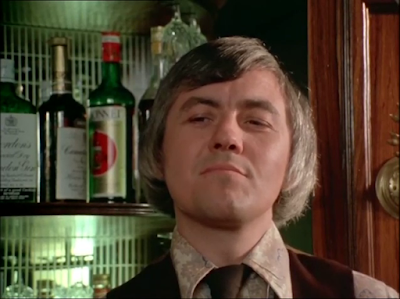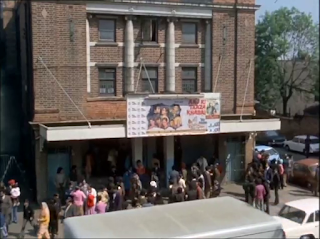%20piss%20holes%20in%20the%20snow.JPG) |
| Pissholes in the snow? |
Sometimes the story behind the making of a film is as
fascinating as the final product itself. I’d never heard of this film but
that’s not unusual as I was in junior school at the time however there’s good reason
why it’s not come to my attention since then as one of a piece with other tough-edged
fare of this period including obviously Get Carter but also Sitting
Target, Villain, Unforgiven, Man of Violence and many more.
The film was the second one made by the Pemini
Organisation made up of Peter Crane,
Michael Sloan and Nigel Hodgson who leaving film school combined forces, and
the first two letters of their names, to create this bold new imprint with
which to make films that would capture the new wave of British style… a “young,
independent British production company…” with “enthusiasm and vitality who don’t
just talk about films, they make them”.
Sadly, despite making three well-cast and inventive films in three years, Pemini ran out of steam and funding leaving their output long unseen until the release of this superb Blu-ray set including Hunted, a high-suspense thriller starring Edward Woodward and June Ritchie, and two feature films: Moments, an enigmatic romantic mystery starring Keith Michell and Angharad Rees, and this one, Assassin, starring Ian Hendry, Edward Judd, Frank Windsor, Ray Brooks and Mike Pratt. The company’s ultimate failure was not down to lack of class or imagination but the complexities of distribution and the arid marketplace in seventies Britain for films that did not quite fit.
.JPG) |
| Ina Hendry |
Directed by Peter Crane from a script by Michael Sloane, Assassin
is full of fresh energy from the get-go as a darkened room shows illicit hands photographing
classified materials. The scenes shift and we’re at British intelligence with MI5
Controller (Edward Judd) calling in his men to authorise a hit on the suspect
who we quickly see is Ministry of Defence official John Stacy (Frank Windsor).
Control tells two of his finest, Matthew (Mike Pratt on excellent form, edgy
and unpredictable) and Luke (Frank Duncan) – biblical reference duly noted – to
keep an eye, as he’s calling in one of the deadliest guns for hire and, at this
short notice, and so un-planned, anything could go wrong.
Meanwhile we find Stacy working late in his office with, incidentally, a very attractive and familiar young secretary (Celia Imrie in her first film role). We discover that Stacy’s about to be the best man of the man who has just got the promotion he was, once again, passed over for, public school educated and connected, Edward Craig (Ray Brooks). Stacy’s preoccupied about many things yet he joins Craig’s stage night and is happy to be his best man for the wedding. Stacy’s wife Ann (the excellent Caroline John, RSC member and an early companion for Jon Pertwee’s Doctor) understands both men full well and just wishes her’s would accept his achievements in rising from state school and the working class.
%20wedding%202.JPG) |
| Caroline John and Frank Windsor |
If Stacy thinks he has problems, things are about to get worse as his Assassin arrives in the UK and begins to prepare for his work. Ian Hendry is magnetic in this film, carrying a wearily professional air but also clearly traumatised by his lifestyle and a recent near miss involving an Eastern Block agent who very nearly outcompeted him. There’s only so long you can stay on top of this game and this mission has come at the wrong time as he is not only haunted by the near-death experience but actively seeking to get out of the game.
Killing time before his appointment with Stacy – he’s the perfect spot overlooking the car park of the wedding venue and where he can make the kill in a public space to send the appropriate message to the other side – he ends up in a pub talking to a very pretty young woman (Verna Harvey). Harvey is a former ballerina who danced with the Bolshoi at Covent Garden aged 14 and had a very busy seventies as an actor before, presumably, starting a family as well as moving into production. She’s very good here, a pure hearted woman who provides an opportunity for some humanity and tenderness to the Assassin who ultimately knows she cannot be for him.
%20look.JPG) |
| Verna Hervey |
The film is very good at presenting the dichotomy between
“real life” as we happily assume it to be and the urgencies and sickness of
professional, state-sponsored killings. Hendry’s character lives in another
world, one where his peace of mind has forever been shattered by his murderous
routines and the ever-present thought that he himself is being watched all of
the time: a deadly weapon and, ultimately, a threat to every side.
There’s also a superbly executed rhythm as the story moves inexorably towards what will have to be a deadly conclusion. As Stacy and Ann play their parts at the wedding and our gunman enjoys his romantic interlude, we know things are about to explode… what we can’t be sure about is exactly for whom that bell is going to toll.
.JPG) |
| Caroline John, Franks Windsor and Ray Brooks |
Dusty verdict: Assassin is an impactful,
pacey film full of interesting moments and skilled performances, it certainly
stands up both as a time-capsule but also as entertainment and I would highly
recommend this set.
It includes:
· New restorations of Hunted and Assassin from 4K scans of the only surviving film elements by Powerhouse Films
· Audio commentaries on Hunted and Assassin with Pemini co-founder and director Peter Crane and film historian Sam Dunn (2022)
· Organising Principles (2022, 32 mins): Crane remembers the origins of Pemini and his subsequent work in Hollywood.
· An Amazing Time (2022, 7 mins): Pemini co-founder and writer Michael Sloan looks back at his three early films.
· Good Chemistry (2022, 29 mins): Pemini co-founder Nigel Hodgson revisits an exciting chapter in his life.
· A Group of Friends (2022, 14 mins): June Ritchie, star of Hunted, recalls her time with Pemini.
· Scoring with Gerry (2022, 13 mins): the veteran Soho musician Graham Dee remembers his work with Gerry Shury on the compositions for In Search of Lebanon and Hunted
The three films are accompanied by a wealth of newly produced extras, including feature-length director commentaries, cast and crew interviews, and an 80-page book. It is a numbered limited edition – mine’s 1487/6000 – so I wouldn’t hang around if I were you, get your order in and take a trip back to a most excellent adventure: “an amazing time” indeed!
You can order from Powerhouse Films where it's on special offer!
.JPG) |
| Edward Judd |
%202.JPG) |
| Mike Pratt and Frank Duncan |
%20room.JPG) |
| Verna Harvey and Ian Hendry |
%20Asimov.JPG) |
| Is Ian reading Isaac Asimov's Foundation or The Assassin? |
%20tube.JPG) |
| Interesting to see the ads for other films of the time, Pulp and Shaft |












